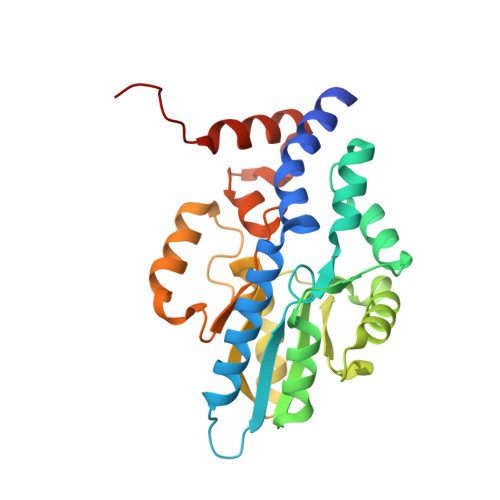Recognition of nucleoside monophosphate substrates by Haemophilus influenzae class C acid phosphatase.
Singh, H., Schuermann, J.P., Reilly, T.J., Calcutt, M.J., Tanner, J.J.(2010) J Mol Biol 404: 639-649
- PubMed: 20934434
- DOI: https://doi.org/10.1016/j.jmb.2010.09.065
- Primary Citation of Related Structures:
3OCU, 3OCV, 3OCW, 3OCX, 3OCY - PubMed Abstract:
The e (P4) phosphatase from Haemophilus influenzae functions in a vestigial NAD(+) utilization pathway by dephosphorylating nicotinamide mononucleotide to nicotinamide riboside. P4 is also the prototype of class C acid phosphatases (CCAPs), which are nonspecific 5',3'-nucleotidases localized to the bacterial outer membrane. To understand substrate recognition by P4 and other class C phosphatases, we have determined the crystal structures of a substrate-trapping mutant P4 enzyme complexed with nicotinamide mononucleotide, 5'-AMP, 3'-AMP, and 2'-AMP. The structures reveal an anchor-shaped substrate-binding cavity comprising a conserved hydrophobic box that clamps the nucleotide base, a buried phosphoryl binding site, and three solvent-filled pockets that contact the ribose and the hydrogen-bonding edge of the base. The span between the hydrophobic box and the phosphoryl site is optimal for recognizing nucleoside monophosphates, explaining the general preference for this class of substrate. The base makes no hydrogen bonds with the enzyme, consistent with an observed lack of base specificity. Two solvent-filled pockets flanking the ribose are key to the dual recognition of 5'-nucleotides and 3'-nucleotides. These pockets minimize the enzyme's direct interactions with the ribose and provide sufficient space to accommodate 5' substrates in an anti conformation and 3' substrates in a syn conformation. Finally, the structures suggest that class B acid phosphatases and CCAPs share a common strategy for nucleotide recognition.
Organizational Affiliation:
Department of Chemistry, University of Missouri-Columbia, Columbia, MO 65211, USA.
















